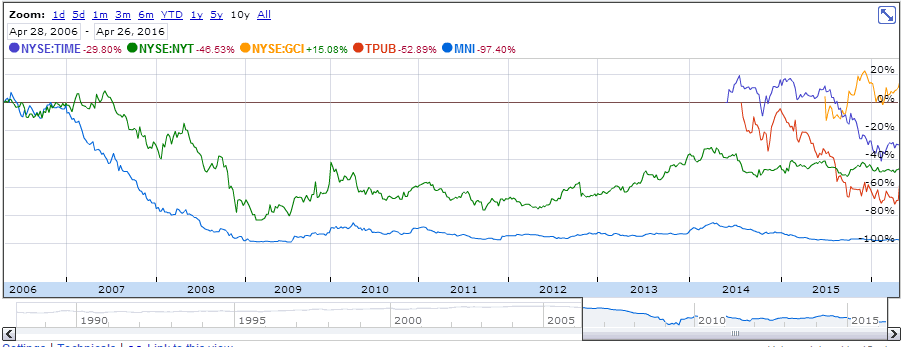SEO Book.com |
| The (Hollow) Soul of Technology Posted: 09 May 2016 04:01 PM PDT The Daily ObituaryAs far as being an investable business goes, news is horrible. And it is getting worse by the day. Look at these top performers.
The above chart looks ugly, but in reality it puts an optimistic spin on things...
Selling The StoryAlmost all the solutions to the problems faced by the mainstream media are incomplete and ultimately will fail. That doesn't stop the market from selling magic push button solutions. The worse the fundamentals get, the more incentive (need) there is to sell the dream. VideoVideo will save us. No it won't. Video is expensive to do well and almost nobody at any sort of scale on YouTube has an enviable profit margin. Even the successful individuals who are held up as the examples of success are being squeezed out and Google is trying to push to make the site more like TV. As they get buy in from big players they'll further squeeze out the indy players - just like general web search. Even if TV shifts to the web, along with chunks of the associated ad budget, most of the profits will be kept by Google & ad tech management rather than flowing to publishers. Some of the recent acquisitions are more about having more scale on an alternative platform or driving offline commerce rather than hoping for online ad revenue growth. Expand InternationallyThe New York times is cutting back on their operations in Paris. Spread Across TopicsWhat impact does it have on Marketwatch's brand if you go there for stocks information and they advise you on weight loss tips? And, once again, when everyone starts doing that it is no longer a competitive advantage. There have also been cases where newspapers like The New York Times acquired About.com only to later sell it for a loss. And now even About.com is unbundling itself.
Native AdsThe more companies who do them & the more places they are seen, the lower the rates go, the less novel they will seem, and the greater the likelihood a high-spending advertiser decides to publish it on their own site & then drive the audience directly to their site. When it is rare or unique it stands out and is special, justifying the extra incremental cost. But when it is a scaled process it is no longer unique enough to justify the vastly higher cost. Further, as it gets more pervasive it will lead to questions of editorial integrity. Get Into Affiliate MarketingIt won't scale across all the big publishers. It only works well at scale in select verticals and as more entities test it they'll fill up the search results and end up competing for a smaller slice of attention. Further, each new affiliate means every other affiliate's cookie lasts for a shorter duration. It is unlikely news companies will be able to create commercially oriented review content at scale while having the depth of Wirecutter.
Further, as it gets more pervasive it will lead to questions of editorial integrity. Charging People to CommentIt won't work, as it undermines the social proof of value the site would otherwise have from having many comments on it. Meal Delivery KitsAbsurd. And a sign of extreme desperation. Trust Tech MonopoliesHere is Doug Edwards on Larry Page:
If we just give Google or Facebook greater control, they will save us. No they won't. You are probably better off selling meal kits. As time passes, Google and Facebook keep getting a larger share of the pie, growing their rake faster than the pie is growing. Here is the RIAA's Cary Sherman on Google & Facebook:
Over time media sites are becoming more reliant on platforms for distribution, with visitors having fleeting interest: "bounce rates on media sites having gone from 20% of visitors in the early 2000s to well over 70% of visitors today." Accelerated Mobile Pages and Instant Articles? These are not solutions. They are only a further acceleration of the problem. How will giving greater control to monopolies that are displacing you (while investing in AI) lead to a more sustainable future for copyright holders? If they host your content and you are no longer even a destination, what is your point of differentiation? If someone else hosts your content & you are depended on them for distribution you are competing against yourself with an entity that can arbitrarily shift the terms on you whenever they feel like it. "The cracks are beginning to show, the dependence on platforms has meant they are losing their core identity," said Rafat Ali "If you are just a brand in the feed, as opposed to a brand that users come to, that will catch up to you sometime." Do you think you gain leverage over time as they become more dominant in your vertical? Not likely. Look at how Google's redesigned image search shunted traffic away from the photographers. Google's remote rater guidelines even mentioned giving lower ratings to images with watermaks on them. So if you protect your works you are punished & if you don't, good luck negotiating with a monopoly. You'll probably need the EU to see any remedy there. When something is an embarrassment to Google & can harm their PR fixing it becomes a priority, otherwise most the costs of rights management fall on the creative industry & Google will go out of their way to add cost to that process. Facebook is, of course, playing the same game with video freebooting. Algorithms are not neutral and platforms change what they promote to suit their own needs. As the platforms aim to expand into new verticals they create new opportunities, but those opportunities are temporal. Whatever happened to Zynga? Even Buzzfeed, the current example of success on Facebook, missed their revenue target badly, even as they become more dependent on the Facebook feed.
Long after benefit stops passing to the creative person the platform still gets to re-use the work. The Supreme Court only recentlyrefused to hear the ebook scanning case & Google is already running stories about using romance novels to train their AI. How long until Google places their own AI driven news rewrites in front of users? Who then will fund journalism? Dumb it Down
Remember how Panda was going to fix crap content for the web? eHow has removed literally millions of articles from their site & still has not recovered in Google. Demand Media's bolt-on articles published on newspaper sites still rank great in Google, but that will at some point get saturated and stop being a growth opportunity, shifting from growth to zero sum to a negative sum market, particularly as Google keeps growing their knowledge scraper graph.
Now maybe if you dumb it down with celebrity garbage you get quick clicks from other channels and longterm SEO traffic doesn't matter as much. But if everyone is pumping the same crap into the feed it is hard to stand out. When everyone starts doing it the strategy is no longer a competitive advantage. Further, if you build a business that is algorithmically optimized for short-term clicks is also optimizing for its own longterm irrelevancy.
That is why Yahoo! ultimately had to shut down almost all their verticals. They were optimized algorithmically for short term wins rather than building things with longterm resonance. Death by bean counter. The above also has an incredibly damaging knock on effect on society. People miss the key news. "what articles got the most views, and thus "clicks." Put bluntly, it was never the articles on my catching Bernanke pulling system liquidity into the maw of the collapse in 2008, while he maintained to Congress he had done the opposite." - Karl Denninger The other issue is PR is outright displacing journalism. As bad as that is at creating general disinformation, it gets worse when people presume diversity of coverage means a diversity of thought process, a diversity of work, and a diversity of sources. Even people inside the current presidential administration state how horrible this trend is on society:
That is basically the government complaining to the press about it being "too easy" to manipulate the press. Adding Echo to the EchoMuch of what "seems" like an algorithm on the tech platforms is actually a bunch of lowly paid humans pretending to be an algorithm.
This goes back to the problem of the limited diversity in original sources and rise of thin "take" pieces. Stories with an inconvenient truth can get suppressed, but "newsworthy" stories with multiple sources covering them may all use the same biased source.
As algorithms take over more aspects of our lives and eat more of the media ecosystem, the sources they feed upon will consistently lose quality until some sort of major reset happens. The strategy to keep sacrificing the long term to hit the short term numbers can seem popular. And then, suddenly, death.
Micropayments & PaywallsIt is getting cheap enough that just about anyone can run a paid membership site, but it is quite hard to create something worth paying for on a recurring basis. There are a few big issues with paywalls:
"It's only after we've lost everything that we're free to do anything." ― Chuck Palahniuk, Fight Club Categories: |
| You are subscribed to email updates from SEO Book. To stop receiving these emails, you may unsubscribe now. | Email delivery powered by Google |
| Google Inc., 1600 Amphitheatre Parkway, Mountain View, CA 94043, United States | |




No comments:
Post a Comment